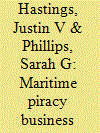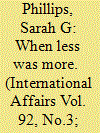|
|
|
Sort Order |
|
|
|
Items / Page
|
|
|
|
|
|
|
| Srl | Item |
| 1 |
ID:
141478


|
|
|
|
|
| Summary/Abstract |
The two regions with the greatest incidence of maritime piracy in Africa, the Horn of Africa and the Gulf of Guinea, are also known for the low quality of the institutions underlying their political economies. This article investigates how institutions in these areas shape and constrain the sophisticated maritime piracy syndicates and their behaviour. Engaging with the literature on state failure and maritime piracy, we argue that norms and institutions constrain even criminal organizations like piracy groups, which often mimic and are embedded in the licit economy. In the Horn of Africa, pirates take structural and ideational cues from the licit economy and are constrained by the informal regulations that govern clan groups, rent-based economic activities, and collective security arrangements in Somalia. In West Africa, sophisticated piracy both preys upon and arises from the formal economy, specifically the international oil industry. As a result, piracy networks often mirror and draw from both the formal institutions in Nigeria used to regulate and protect oil production, and those engaged in oil production, processing, distribution, and transportation.
|
|
|
|
|
|
|
|
|
|
|
|
|
|
|
|
| 2 |
ID:
176232


|
|
|
|
|
| Summary/Abstract |
The dominant international discourse about ‘fragile states’ calls for external actors to build the capacity of domestic institutions as a means of overcoming poverty and insecurity in the global South. It frames the pathway to greater peace and prosperity as primarily, if not entirely, domestically constituted, thereby confining the causes of poverty and insecurity to the domestic arena as well. This article argues that by focusing so intently on the domestic capacity of these states, international peace/state-building and development interventions discount, and thereby reinforce, non-domestic factors that impede security and development. These include: external support for repressive regimes; the sale of weapons to local actors; and the preservation of international trade arrangements implicated in sustaining global inequalities. This article argues that while each of these issues have greater levers for change in the North than in the South, they are generally excluded from discourses about overcoming poverty and insecurity. Therefore, if international actors are serious about attending to these issues, there are more pressing areas for reform than the internal institutional configurations of Southern states. Intervening in domestic institutions is, however, what development and state-building agencies are structured to do, meaning that to overhaul this mandate would directly challenge their existence.
|
|
|
|
|
|
|
|
|
|
|
|
|
|
|
|
| 3 |
ID:
168556


|
|
|
|
|
| Summary/Abstract |
This article is concerned with the relationship between the quality of a country's governance institutions and the degree of civil order it experiences. Using evidence from Somaliland, it argues that order and peaceful cohabitation can be sustained not only when, but even partly because, governance institutions are incapable of reliably controlling violence. It suggests that Somaliland's postconflict peace is less grounded in the constraining power of its governance institutions than in a powerful discourse about the country's structural, temporal, and physical proximity to war. Through its sensitivity to the ease with which peace gives way to war, this discourse indirectly harnesses an apparent propensity to disorder as a source of order. This case challenges the “common sense” causal relationship between institutions and order. If either the strength or the weakness of institutions can offer foundations for order, then neither quality can be assigned as its cause without also being its effect. This has important implications beyond Somaliland by suggesting that, if weak institutions can support order under certain discursive conditions, then discourse—which is inherently fluid—also mediates the relationship between robust institutions and order. This makes them more susceptible to rapid change than usually imagined.
|
|
|
|
|
|
|
|
|
|
|
|
|
|
|
|
| 4 |
ID:
145289


|
|
|
|
|
| Summary/Abstract |
The internationally unrecognized ‘Republic of Somaliland’ presents a case in which the domestic drivers of peace and development may be examined when aid and other forms of international intervention are not significant variables. The relative autonomy of its peace process offers an alternative perspective on post-conflict transitions to that offered in the majority of the literature, which instead problematizes either the perverse outcomes or unintended consequences of international interventions in conflict-affected areas. The purpose of this article is not to establish the salience of Somaliland's relative isolation in its ability to achieve peace and relative political order, as this is already documented in the literature. Rather, it explores the ways in which that isolation fostered mutual dependence between powerful political and economic actors for their survival and prosperity. It uses a political settlements framework to probe the implications of this dependence for western statebuilding interventions in post-conflict situations. The findings present a challenge to orthodox assumptions about how states transition out of conflict, particularly that: greater vertical inclusivity necessarily strengthens a political settlement; effective Weberian institutions are a prerequisite of an enduring peace; and that external assistance is usually necessary to end large-scale violence in developing states or to prevent a recurrence of the conflict.
|
|
|
|
|
|
|
|
|
|
|
|
|
|
|
|
|
|
|
|
|